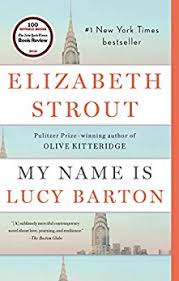My Name is Lucy Barton

Elizabeth Stroud’s 2016 best-selling novel, My Name is Lucy Barton, examines the literary challenge of capturing an internal emotional experience and translating it to tell a meaningful story. The novel begins from Lucy’s hospital bed in Manhattan where she is battling a substantial but undiagnosed illness. Lucy’s husband is struggling to balance work, caring for their young daughters, and visiting the hospital. In desperation, he convinces Lucy’s provincial mother, who has never boarded an airplane, to fly to town and keep Lucy company in the hospital. The mother-daughter dynamic in Lucy’s hospital room becomes a vehicle to explore Lucy’s difficult past. Their conversations create a healing effect, raising the unspoken possibility that Lucy’s time in the hospital is primarily concerned with disinfecting childhood wounds. Meanwhile, Lucy’s crush on her doctor, while hospitalized and following her discharge, signals the tenuousness of her marriage.
Stroud’s writing is crisp, exposing, and humorous:
I tried to look nice; I remember I would try on different outfits and look in the mirror to see what he would see. In his office he had people in his waiting room, people in his examining rooms, then in his own office, a sort of conveyor belt of many kinds of human material. I thought of how many people’s behinds he had seen, how different they all must be. I always felt safe with him…He was speaking to a very old woman; she was carefully dressed – we had this in common, to be clean and carefully dressed for our doctor. She said “I have flatulence. It’s so embarrassing. What can I do?” He shook his head sympathetically. “That’s a toughie,” he said. For years, my girls would say “That’s a toughie” to something that was a pickle for them – they heard me tell the story so many times.
Despite his limitations, Lucy’s husband is responsible for arranging the transformational gift of her mother’s hospital visit. Time is fluid throughout the novel, and the reader learns that Lucy’s husband was also responsible for convincing Lucy to travel and study with a gifted writer whom Lucy admires. The class becomes a catalyst for Lucy’s unexpected literary success. As Lucy struggles to develop as a writer, the dynamics of perspective, truth and storytelling unfold through an honest and compelling telling of Lucy’s truth:
Do I understand that hurt my children feel? I think I do, though they might claim otherwise. But I think I know so well the pain we children clutch to our chests, how it lasts our whole lifetime, with longings so large you can’t even weep. We hold it tight, we do, with each seizure of the beating heart.
This beautiful, memorable story is a tribute to the art of writing and the complexity of love.
